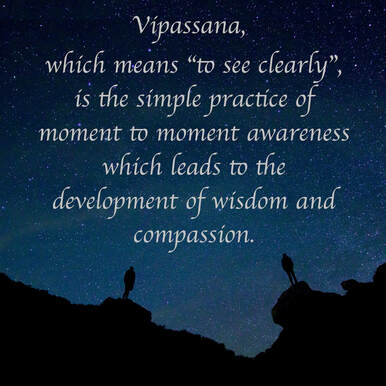Welcome to Insight Western Mass (IWM)
Formerly known as Insight PV

What is Insight Meditation?
Insight Meditation, also known as Vipassana or mindfulness meditation, originated in the Theravada School of Buddhism, now primarily located in India, Sri Lanka, Cambodia, and Burma. Vipassana, which means "to see clearly", is the simple practice of moment to moment awareness which leads to the development of wisdom and compassion.
Mindfulness, or present-time non-judgmental attention, comprises the heart of Buddhist meditation practice. This awareness training has been cultivated in Asia for over 2,500 years and, because of its simplicity and power, is now practiced by people from a wide variety of spiritual outlooks.
By cultivating mindfulness, we experience for ourselves the ever-changing flow of the mind/body, including sensations in body, hearing, thoughts, emotions, and consciousness itself. This awareness leads us to a deeper intimacy with life, and a greater ability to accept more fully the pleasure and pain, fear and joy, sadness and happiness that life inevitably brings. As insight deepens, we develop greater peace and equanimity in the face of the three basic characteristics of reality, the truths of impermanence (annica), unsatisfactoriness (dukkha), and not-self (anatta).
Our practice also develops qualities of heart and mind known as the spiritual perfections (paramis), such as generosity, ethical conduct, patience, simplicity, lovingkindness, and equanimity. With greater clarity and freedom in our hearts and minds, and from a place of greater wisdom and compassion, we can share the fruits of our practice with others through our caring and service.
Where to Start
We have open sittings suitable for all levels on Mondays 5:30-6:15pm with discussion until 6:45, Wednesdays 7:00 - 7:30pm with a Dharma talk by an IWM or visiting teacher until 8:30 pm, and Thursdays 7:45-8:30am. Our open sittings are currently on Zoom only, and our dharma talks vary between in-person/hybrid and Zoom. Please see our offerings page for more details.
Affinity groups are another great place to start and meet people. We have groups for Queer & Trans, Young Adults, and Family Gatherings. (Our People of Color sitting is on hold at the moment.) Affinity groups are currently on a COVID pause.
We are also proud to host a Refuge Recovery group for those in or interested in recovery from addiction. Friday Evening's Recovery Dharma has gone online indefinitely in observance of social-distancing practices. Time and meeting format will remain the same: meeting starts at 7pm and goes until approximately 8:10pm. Please join by emailing [email protected] to get the Zoom online meeting information.
There’s no need to sign up although you might want to come a a few minutes early in order to have time to get settled comfortably. For in-person gatherings, we typically have cushions and chairs. Depending on the venue, we may also have mats, blankets, and bolsters available. The teacher or facilitator usually asks if anyone is new, but you might want to mention to them ahead of time. If you are unsure which would be better, we recommend the Wednesday nights if you're able, because they're led by a Dharma teacher. All of our offerings are offered freely. Many have suggested donation amounts, but no one is turned away for inability to donate.
Click below for more information on IWM Teachers, our tradition of dana (generosity), and Dharma Talks :
Orientations: We also offer Orientations to provide more detailed information, including an overview of IWM history, mission and guiding principles as well as the basics of insight meditation and sitting posture. You do not need to attend an orientation before attending an open sitting or our courses or retreats. The orientation is appropriate for those who are new to IWM and those who would like more information about the center and the practice of meditation. Orientations are held every other first Monday right after the 5:30 sitting in February, April, June, August, October, and December each year. Upcoming Dates